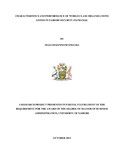| dc.description.abstract | Many organizations in Kenya have failed to master this concept of world class and have been restricted to operate within just the local market. With the coming of liberalization of the Kenyan market in the 1990s, major WCOs came into the local market and some of the Kenyan companies were forced to wound up. This study therefore sought to investigate the characteristics of world class organizations in Kenya. The study also sought to investigate the business models adopted by achieving a world class organization; to identify the ICT practices, human resource practice, CSR practice and operations management practices adopted in relation to achieving world Class organizations; and to link the characteristics of world class organizations practices to performance. The study used a descriptive research design. The target population will be the heads of human resource, operations, ICT and CSR departments in all 43 companies listed in the NSE and 10 companies that are considered Superbrand in Kenya. Purposive sampling will be used to select 10 companies that are considered Superbrand in Kenya (Best rated by Superbrand) and top 10 performing companies in the NSE but not listed as Superbrand. Both primary and secondary data were used. Primary data was collected by use of semi structured questionnaires. In the data analysis, both qualitative and quantitative data analysis methods will be used in the analysis of data. Quantitative data was edited and coded into a statistical package (Statistical Package for Social Sciences (SPSS) version 21) for analysis. Both descriptive and inferential statistics were used to analyze quantitative data. In relation to inferential statistics the study used correlation analysis to investigate on the effect of independent variables on the dependent. In descriptive statistics, the study used frequency and percentages. The analyzed data was then presented in tables and figures. On the other hand, qualitative data was coded thematically an analyzed using thematic content analysis. The study established that business models, ICT practices, human resource practices, CSR practice and operations management practices influence organizational performance of world class organizations positively. The study therefore recommends that NSE listed companies should fully adopt information communication and technology in all their processes and operations so as to achieve a world class performance. | en_US |

